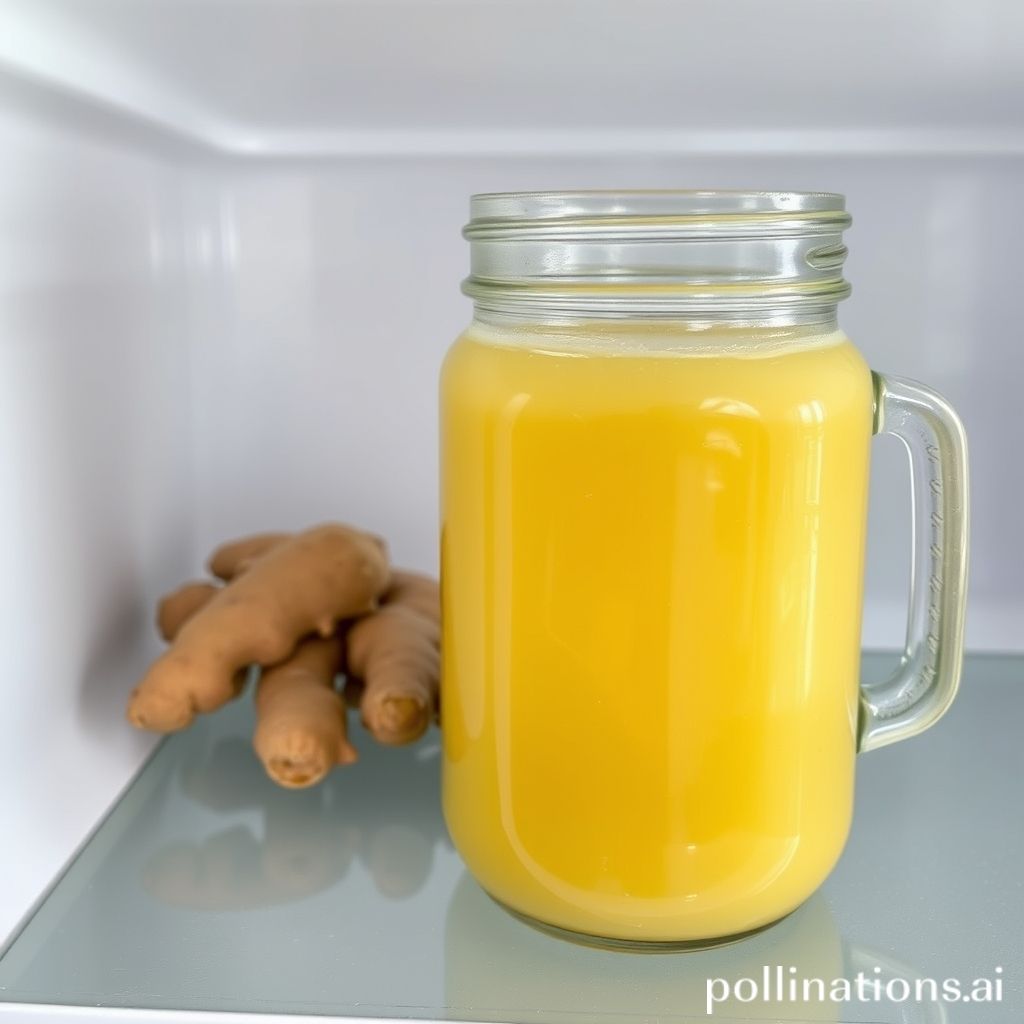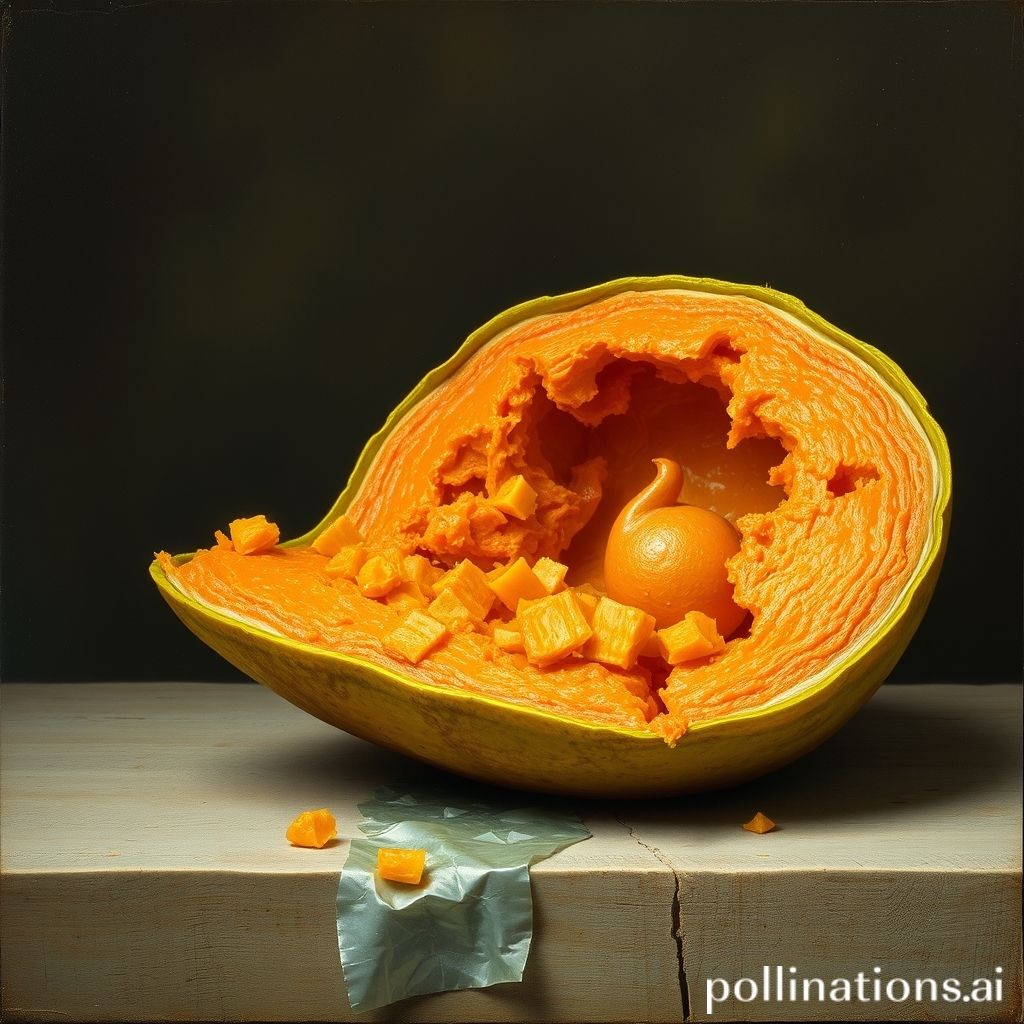Preserving Freshness: The Shelf Life of Refrigerated Ginger Juice
When we talk about ginger juice, people often wonder how long it can be stored in the fridge. They want to know the shelf life or expiration date of ginger juice and how long they can keep it before it goes bad.
Ginger juice is known for its numerous health benefits, from boosting digestion to relieving nausea. So, it’s no surprise that people want to ensure they can enjoy its benefits for as long as possible. In this article, we will discuss the storage life of ginger juice in the refrigerator and provide you with some helpful tips to keep it fresh. Get ready to learn all about ginger juice storage!

Table of Contents
Comprehending the Shelf Life of Ginger Juice
1. Factors Affecting Shelf Life
Ginger juice, like any other perishable food product, has a limited shelf life. Several factors influence how long ginger juice can stay fresh and retain its quality. These factors include:
- 1.1 Quality of Ginger: The freshness and quality of the ginger used to make the juice play a crucial role in determining its shelf life. If fresh and high-quality ginger is used, the juice will last longer.
- 1.2 Processing Method: The way ginger juice is extracted and processed can impact its shelf life. Cold-pressed ginger juice tends to have a longer shelf life compared to heat-treated or pasteurized juice.
- 1.3 Additives and Preservatives: Some ginger juices may contain additives or preservatives to extend their shelf life. The presence of these additives can influence how long the juice remains safe to consume.
2. Importance of Proper Storage
Proper storage of ginger juice is vital for maintaining its freshness and quality. To ensure the best shelf life, it is important to follow these guidelines:
- 2.1 Refrigeration: Storing ginger juice in the refrigerator is highly recommended. The cold temperature helps slow down the growth of bacteria and other microorganisms, extending the juice’s shelf life.
- 2.2 Air-Tight Container: Transfer the ginger juice into an air-tight container before refrigerating it. This step prevents the juice from absorbing odors and helps maintain its flavor and aroma.
- 2.3 Avoid Contamination: Always use clean utensils and hands when handling ginger juice. Contamination can introduce harmful bacteria, which shortens the juice’s shelf life.
Remember, it is essential to check the expiration date or any specific instructions provided by the manufacturer of the ginger juice you purchase. Following their recommendations will ensure optimal freshness and quality.
Expert Tips:1. Use fresh and high-quality ginger for longer shelf life.
2. Opt for cold-pressed ginger juice for extended freshness.
3. Look for additives/preservatives to prolong shelf life.
4. Refrigerate ginger juice in an air-tight container.
5. Avoid contamination with clean utensils and hands.
Shelf Life of Ginger Juice in the Fridge
1. Unopened Ginger Juice
When stored properly in the refrigerator, unopened ginger juice can maintain its quality and freshness for up to two months from the date of purchase. To ensure its freshness before consumption, it is important to check the expiration date on the packaging.
2. Opened Ginger Juice
Once ginger juice has been opened, its shelf life decreases significantly. When stored in the refrigerator, opened ginger juice can generally remain good for about one month. Notwithstanding, it is crucial to note any changes in taste, texture, or appearance. If the ginger juice becomes discolored, develops an off-putting odor, or tastes different, it is advisable to discard it even if it is within the mentioned time frame.
To extend the shelf life of opened ginger juice, consider transferring it to an airtight container to minimize exposure to air and moisture. This can help preserve its flavor and quality for a longer period. Additionally, storing the ginger juice at a consistent temperature in the refrigerator, ideally between 35°F (2°C) and 40°F (4°C), can further enhance its longevity.
Remember to always follow the storage instructions provided by the manufacturer to ensure optimal freshness and quality of your ginger juice. Proper storage and timely consumption are essential for enjoying the maximum benefits of ginger juice.
| Ginger Juice Type | Shelf Life (Unopened) | Shelf Life (Opened) |
|---|---|---|
| Unopened Ginger Juice | Up to 2 months | N/A |
| Opened Ginger Juice | N/A | Approximately 1 month |
Signs of Ginger Juice Going Bad
1. Changes in Color and Texture
If ginger juice has gone bad, you may notice changes in its color and texture. Fresh ginger juice is usually pale yellow or light brown, but when it spoils, it can darken or become cloudy. The texture may also become thicker or grainy, indicating that it has lost its freshness.
2. Unpleasant Odor
A strong and unpleasant odor is a clear sign that ginger juice has spoiled. Fresh ginger juice has a distinct and aromatic fragrance, but when it starts to go bad, it may emit a foul or rancid smell. If the ginger juice smells off or rotten, it is best to throw it away.
3. Development of Mold
If you see mold growth on ginger juice, it means that it has deteriorated and is no longer safe to consume. Mold can appear as green, white, or black patches on the surface of the juice. It is important to discard the ginger juice if any mold is present, as consuming moldy food or beverages can lead to health issues.
To ensure the longevity and quality of ginger juice, it is recommended to store it properly in an airtight container in the refrigerator. It is advisable to consume ginger juice within a specific timeframe to enjoy its optimal flavor and benefits.
Always trust your senses when determining if ginger juice has gone bad. If you notice changes in color and texture, an unpleasant odor, or the presence of mold, it is best to be cautious and dispose of the ginger juice.

Extending the Shelf Life of Ginger Juice
1. Freezing Ginger Juice
To extend the shelf life of ginger juice, you can freeze it. Follow these steps:
- Prepare the ginger juice by grating or blending fresh ginger.
- Transfer the ginger juice into ice cube trays or small freezer-safe containers.
- Label the containers with the date to keep track of the storage time.
- Place the containers in the freezer and allow them to freeze completely.
- Once frozen, remove the ginger juice cubes from the trays and transfer them into freezer bags or airtight containers.
- Store the ginger juice in the freezer for up to 3 months.
When you need ginger juice, simply thaw the desired amount in the refrigerator overnight or defrost it using the defrost function of your microwave.
2. Adding Preservatives
If you don’t want to freeze ginger juice, you can add preservatives to prolong its shelf life. Here are some common preservatives:
- Lemon Juice: Adding a small amount of lemon juice to ginger juice can inhibit bacterial growth and keep it fresh for longer.
- Vinegar: Similar to lemon juice, vinegar acts as a natural preservative that prevents spoilage and extends the shelf life of ginger juice.
- Honey: Honey has antimicrobial properties and can be added to ginger juice to enhance its preservation.
When using preservatives, make sure to follow proper storage guidelines and refrigerate the ginger juice. Always check the quality and smell of the ginger juice before consuming it, and discard if it appears spoiled or has an off odor.
| Preservative | Function |
|---|---|
| Lemon Juice | Inhibits bacterial growth |
| Vinegar | Acts as a natural preservative |
| Honey | Enhances preservation with antimicrobial properties |
By freezing ginger juice or adding preservatives, you can prolong its shelf life and enjoy its freshness for a longer period. Choose the method that suits your preference and storage capabilities.
Using Ginger Juice Past Its Shelf Life
1. Risks and Considerations
Ginger juice, like any other food product, has a limited shelf life. Using ginger juice past its expiration date can pose risks as it becomes more susceptible to bacterial growth. This can result in foodborne illnesses, causing symptoms such as nausea, vomiting, diarrhea, and abdominal pain. Before using expired ginger juice, it’s important to be aware of these risks and consider the potential consequences.
2. Quality and Taste Changes
Using ginger juice beyond its expiration date can lead to noticeable changes in its quality and taste. Over time, the flavor and aroma of ginger juice can diminish, making it less potent and flavorful. Expired ginger juice may develop an off-putting smell or taste due to spoilage. This can significantly impact the overall taste and quality of dishes or beverages it is added to, compromising the desired flavor profile.
Furthermore, as ginger juice ages, its texture may change. It can become thicker or develop sedimentation, affecting its suitability for certain culinary applications and its visual appeal.
It’s important to note that the exact changes in quality and the duration of ginger juice’s shelf life may vary depending on factors such as processing method, packaging, and storage conditions. Albeit, to ensure optimal taste and safety, it is generally recommended to adhere to the expiration date provided by the manufacturer or follow the guidelines for homemade ginger juice storage.
Conclusion
Knowing the shelf life of ginger juice stored in the fridge is essential for maintaining its quality and freshness. Meanwhile is no specific expiration date for ginger juice, it is generally recommended to consume it within one week to ensure optimal taste and benefits.
Proper storage, such as keeping the juice in an airtight container and refrigerating it at the right temperature, can help prolong its lifespan. By adhering to these guidelines, you can enjoy the refreshing and flavorful properties of ginger juice for longer periods without compromising its quality.
FAQ about Ginger Juice Shelf Life
FAQ 1: How long does unopened ginger juice last in the fridge?
Unopened ginger juice can last for about 1 to 2 months when stored in the refrigerator. It is important to check the expiration date on the packaging before consuming.
FAQ 2: Can I use ginger juice after the expiration date?
It is not recommended to use ginger juice after the expiration date. Consuming expired ginger juice may pose health risks, as the quality and safety of the product cannot be guaranteed.
FAQ 3: Can I freeze ginger juice to prolong its shelf life?
Yes, you can freeze ginger juice to extend its shelf life. Freezing ginger juice can help preserve its freshness and flavor for up to 6 months. Make sure to store it in an airtight container or freezer bag to prevent freezer burn.
FAQ 4: How can I tell if ginger juice has gone bad?
You can tell if ginger juice has gone bad by checking for signs of spoilage. If the juice has an off smell, unusual color, or if mold is present, it is best to discard it. Additionally, if the taste is significantly different or unpleasant, it is a good indication that the ginger juice has gone bad.
FAQ 5: Are there any risks in consuming expired ginger juice?
Consuming expired ginger juice can pose health risks. The expired juice may contain harmful bacteria or toxins that can cause food poisoning or other illnesses. It is advisable to always check the expiration date and discard any expired products to ensure food safety.
Read Similar Post:
1. Effortlessly Extract Fresh Ginger Juice with a Juicer: A Step-by-Step Guide
2. Boost Your Well-being with Ginger Juice: Unveiling the Potential Health Benefits
